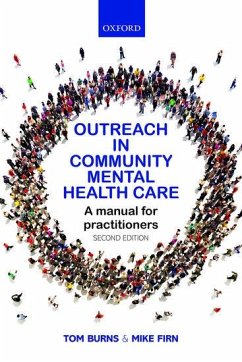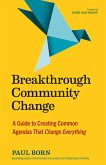Tom Burns (Professor Emeri Professor Emeritus of Social Psychiatry, Mike Firn (Nurse and Nurse Healthcare Consultant and Healthcare Co
Outreach in Community Mental Health Care
A Manual for Practitioners
Tom Burns (Professor Emeri Professor Emeritus of Social Psychiatry, Mike Firn (Nurse and Nurse Healthcare Consultant and Healthcare Co
Outreach in Community Mental Health Care
A Manual for Practitioners
- Broschiertes Buch
- Merkliste
- Auf die Merkliste
- Bewerten Bewerten
- Teilen
- Produkt teilen
- Produkterinnerung
- Produkterinnerung
Outreach in Community Mental Health Care: A Manual for Practitioners offers readers a comprehensive and practical guide to treating patients in the community setting.
Andere Kunden interessierten sich auch für
![Medical Model in Mental Health Medical Model in Mental Health]() Ahmed Samei Huda (Consultant Psychiatrist, Consultant Psychiatrist,Medical Model in Mental Health77,99 €
Ahmed Samei Huda (Consultant Psychiatrist, Consultant Psychiatrist,Medical Model in Mental Health77,99 €![Spirituality and Mental Health Across Cultures Spirituality and Mental Health Across Cultures]() Spirituality and Mental Health Across Cultures99,99 €
Spirituality and Mental Health Across Cultures99,99 €![Conservation Education and Outreach Techniques Conservation Education and Outreach Techniques]() Susan K. Jacobson (Director of the Program for Studies in TropicalConservation Education and Outreach Techniques87,99 €
Susan K. Jacobson (Director of the Program for Studies in TropicalConservation Education and Outreach Techniques87,99 €![Public Engagement Made Easy Public Engagement Made Easy]() Susan CharlandPublic Engagement Made Easy37,99 €
Susan CharlandPublic Engagement Made Easy37,99 €![Breakthrough Community Change Breakthrough Community Change]() Paul BornBreakthrough Community Change20,99 €
Paul BornBreakthrough Community Change20,99 €![Amplified Outreach Bible, Paperback Amplified Outreach Bible, Paperback]() ZondervanAmplified Outreach Bible, Paperback12,99 €
ZondervanAmplified Outreach Bible, Paperback12,99 €![NKJV, Value Outreach Bible, Paperback NKJV, Value Outreach Bible, Paperback]() Thomas NelsonNKJV, Value Outreach Bible, Paperback8,49 €
Thomas NelsonNKJV, Value Outreach Bible, Paperback8,49 €-
-
-
Outreach in Community Mental Health Care: A Manual for Practitioners offers readers a comprehensive and practical guide to treating patients in the community setting.
Hinweis: Dieser Artikel kann nur an eine deutsche Lieferadresse ausgeliefert werden.
Hinweis: Dieser Artikel kann nur an eine deutsche Lieferadresse ausgeliefert werden.
Produktdetails
- Produktdetails
- Verlag: Oxford University Press
- 2 Revised edition
- Seitenzahl: 400
- Erscheinungstermin: 15. August 2017
- Englisch
- Abmessung: 231mm x 155mm x 20mm
- Gewicht: 604g
- ISBN-13: 9780198754237
- ISBN-10: 019875423X
- Artikelnr.: 48570979
- Herstellerkennzeichnung
- Libri GmbH
- Europaallee 1
- 36244 Bad Hersfeld
- gpsr@libri.de
- Verlag: Oxford University Press
- 2 Revised edition
- Seitenzahl: 400
- Erscheinungstermin: 15. August 2017
- Englisch
- Abmessung: 231mm x 155mm x 20mm
- Gewicht: 604g
- ISBN-13: 9780198754237
- ISBN-10: 019875423X
- Artikelnr.: 48570979
- Herstellerkennzeichnung
- Libri GmbH
- Europaallee 1
- 36244 Bad Hersfeld
- gpsr@libri.de
Tom Burns is Professor Emeritus of Social Psychiatry at the University of Oxford. Before that he was consultant psychiatrist and professor of Community Psychiatry at St George's in South West London where he and Mike Firn together set up and ran the Wandsworth Assertive Community Treatment Team. He has predominantly researched community mental health services practice, particularly complex interventions. He has published six books with Oxford University Press. Our Necessary Shadow: The Nature and Meaning of Psychiatry, a book on psychiatry for the general reader was published by Penguin in 2014. He was awarded the CBE in 2006 for services to mental health care. Mike Firn has over 30 years' experience in the National Health Service in England as a registered nurse, team leader and operational manager. He has set up, developed and evaluated numerous new community mental health teams across the care pathway from early intervention, assertive outreach and crisis services. He is a current board member of national and European clinical networks in assertive outreach. He also provides much of his time as an external consultant for an independent charity, The Health Foundation, working alongside grant funded health innovation projects.
Conceptual issues
1: The evolution of community outreach
2: Current context and aims
3: Who is assertive outreach for? Referrals and discharges
4: Model variance and model fidelity: the lessons from ACT
5: Key working versus the 'whole-team approach'
6: Access: office hours, shifts or 24/7 availability?
7: The role of medication
8: Compulsion and freedom
9: Cultural sensitivity
Health and social care practice
10: Engagement
11: Medication compliance
12: Hostility
13: Suicidality
14: Self-neglect
15: Schizophrenia and delusional disorders
16: Bipolar affective disorder
17: Personality problems and disorders
18: Depression, anxiety, and situational disorders
19: Substance misuse/dual diagnosis
20: Finance and appointeeship
21: Housing and homelessness
22: Physical health care
23: Employment
24: Daily living skills
25: Psychosocial interventions with families, carers and patients
Management and Development
26: Operational and team management
27: Training
28: Service planning
29: Research and development
1: The evolution of community outreach
2: Current context and aims
3: Who is assertive outreach for? Referrals and discharges
4: Model variance and model fidelity: the lessons from ACT
5: Key working versus the 'whole-team approach'
6: Access: office hours, shifts or 24/7 availability?
7: The role of medication
8: Compulsion and freedom
9: Cultural sensitivity
Health and social care practice
10: Engagement
11: Medication compliance
12: Hostility
13: Suicidality
14: Self-neglect
15: Schizophrenia and delusional disorders
16: Bipolar affective disorder
17: Personality problems and disorders
18: Depression, anxiety, and situational disorders
19: Substance misuse/dual diagnosis
20: Finance and appointeeship
21: Housing and homelessness
22: Physical health care
23: Employment
24: Daily living skills
25: Psychosocial interventions with families, carers and patients
Management and Development
26: Operational and team management
27: Training
28: Service planning
29: Research and development
Conceptual issues
1: The evolution of community outreach
2: Current context and aims
3: Who is assertive outreach for? Referrals and discharges
4: Model variance and model fidelity: the lessons from ACT
5: Key working versus the 'whole-team approach'
6: Access: office hours, shifts or 24/7 availability?
7: The role of medication
8: Compulsion and freedom
9: Cultural sensitivity
Health and social care practice
10: Engagement
11: Medication compliance
12: Hostility
13: Suicidality
14: Self-neglect
15: Schizophrenia and delusional disorders
16: Bipolar affective disorder
17: Personality problems and disorders
18: Depression, anxiety, and situational disorders
19: Substance misuse/dual diagnosis
20: Finance and appointeeship
21: Housing and homelessness
22: Physical health care
23: Employment
24: Daily living skills
25: Psychosocial interventions with families, carers and patients
Management and Development
26: Operational and team management
27: Training
28: Service planning
29: Research and development
1: The evolution of community outreach
2: Current context and aims
3: Who is assertive outreach for? Referrals and discharges
4: Model variance and model fidelity: the lessons from ACT
5: Key working versus the 'whole-team approach'
6: Access: office hours, shifts or 24/7 availability?
7: The role of medication
8: Compulsion and freedom
9: Cultural sensitivity
Health and social care practice
10: Engagement
11: Medication compliance
12: Hostility
13: Suicidality
14: Self-neglect
15: Schizophrenia and delusional disorders
16: Bipolar affective disorder
17: Personality problems and disorders
18: Depression, anxiety, and situational disorders
19: Substance misuse/dual diagnosis
20: Finance and appointeeship
21: Housing and homelessness
22: Physical health care
23: Employment
24: Daily living skills
25: Psychosocial interventions with families, carers and patients
Management and Development
26: Operational and team management
27: Training
28: Service planning
29: Research and development








